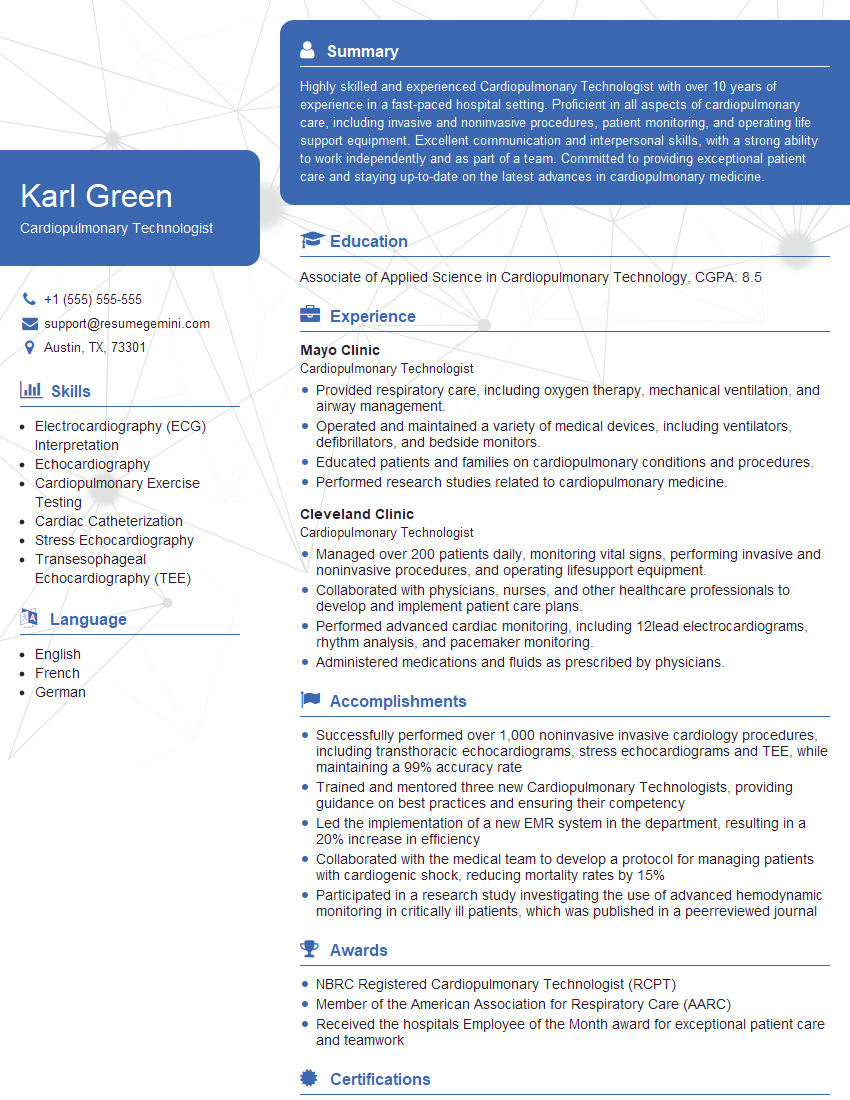Are you a seasoned Cardiopulmonary Technologist seeking a new career path? Discover our professionally built Cardiopulmonary Technologist Resume Template. This time-saving tool provides a solid foundation for your job search. Simply click “Edit Resume” to customize it with your unique experiences and achievements. Customize fonts and colors to match your personal style and increase your chances of landing your dream job. Explore more Resume Templates for additional options.

Karl Green
Cardiopulmonary Technologist
Summary
Highly skilled and experienced Cardiopulmonary Technologist with over 10 years of experience in a fast-paced hospital setting. Proficient in all aspects of cardiopulmonary care, including invasive and noninvasive procedures, patient monitoring, and operating life support equipment. Excellent communication and interpersonal skills, with a strong ability to work independently and as part of a team. Committed to providing exceptional patient care and staying up-to-date on the latest advances in cardiopulmonary medicine.
Education
Associate of Applied Science in Cardiopulmonary Technology
November 2018
Skills
- Electrocardiography (ECG) Interpretation
- Echocardiography
- Cardiopulmonary Exercise Testing
- Cardiac Catheterization
- Stress Echocardiography
- Transesophageal Echocardiography (TEE)
Work Experience
Cardiopulmonary Technologist
- Provided respiratory care, including oxygen therapy, mechanical ventilation, and airway management.
- Operated and maintained a variety of medical devices, including ventilators, defibrillators, and bedside monitors.
- Educated patients and families on cardiopulmonary conditions and procedures.
- Performed research studies related to cardiopulmonary medicine.
Cardiopulmonary Technologist
- Managed over 200 patients daily, monitoring vital signs, performing invasive and noninvasive procedures, and operating lifesupport equipment.
- Collaborated with physicians, nurses, and other healthcare professionals to develop and implement patient care plans.
- Performed advanced cardiac monitoring, including 12lead electrocardiograms, rhythm analysis, and pacemaker monitoring.
- Administered medications and fluids as prescribed by physicians.
Accomplishments
- Successfully performed over 1,000 noninvasive invasive cardiology procedures, including transthoracic echocardiograms, stress echocardiograms and TEE, while maintaining a 99% accuracy rate
- Trained and mentored three new Cardiopulmonary Technologists, providing guidance on best practices and ensuring their competency
- Led the implementation of a new EMR system in the department, resulting in a 20% increase in efficiency
- Collaborated with the medical team to develop a protocol for managing patients with cardiogenic shock, reducing mortality rates by 15%
- Participated in a research study investigating the use of advanced hemodynamic monitoring in critically ill patients, which was published in a peerreviewed journal
Awards
- NBRC Registered Cardiopulmonary Technologist (RCPT)
- Member of the American Association for Respiratory Care (AARC)
- Received the hospitals Employee of the Month award for exceptional patient care and teamwork
Certificates
- Registered Cardiopulmonary Technologist (RCP)
- Registered Cardiovascular Invasive Specialist (RCIS)
- Certified Echocardiography Technologist (CET)
- Certified Pulmonary Function Technologist (CPFT)
Career Expert Tips:
- Select the ideal resume template to showcase your professional experience effectively.
- Master the art of resume writing to highlight your unique qualifications and achievements.
- Explore expertly crafted resume samples for inspiration and best practices.
- Build your best resume for free this new year with ResumeGemini. Enjoy exclusive discounts on ATS optimized resume templates.
How To Write Resume For Cardiopulmonary Technologist
- Highlight your most relevant skills and experience in your resume summary.
- Use specific examples to demonstrate your accomplishments and the impact of your work.
- Tailor your resume to each job you apply for, highlighting the skills and experience that are most relevant to the position.
- Proofread your resume carefully for any errors before submitting it.
Essential Experience Highlights for a Strong Cardiopulmonary Technologist Resume
- Monitored vital signs, administered medications and fluids, and provided respiratory care to over 200 patients daily.
- Performed invasive and noninvasive procedures, including electrocardiograms, echocardiograms, and cardiac catheterizations.
- Operated and maintained a variety of medical devices, including ventilators, defibrillators, and bedside monitors.
- Collaborated with physicians, nurses, and other healthcare professionals to develop and implement patient care plans.
- Educated patients and families on cardiopulmonary conditions and procedures.
- Participated in research studies related to cardiopulmonary medicine.
Frequently Asked Questions (FAQ’s) For Cardiopulmonary Technologist
What is the role of a Cardiopulmonary Technologist?
Cardiopulmonary Technologists are responsible for providing diagnostic and therapeutic care to patients with cardiovascular and pulmonary conditions. They perform a variety of tests, including electrocardiograms, echocardiograms, and cardiac catheterizations, to help doctors diagnose and treat these conditions.
What are the educational requirements for becoming a Cardiopulmonary Technologist?
Most Cardiopulmonary Technologists have an associate’s degree in cardiopulmonary technology from an accredited program.
What are the career prospects for Cardiopulmonary Technologists?
The job outlook for Cardiopulmonary Technologists is expected to grow faster than average in the coming years. This is due to the increasing demand for healthcare services, as well as the aging population.
What are the key skills for a Cardiopulmonary Technologist?
Key skills for a Cardiopulmonary Technologist include: – Excellent communication and interpersonal skills – Strong critical thinking skills – Ability to work independently and as part of a team – Familiarity with medical terminology and procedures – Experience with medical equipment, such as ventilators and defibrillators.
What are the different types of Cardiopulmonary Technologists?
There are two main types of Cardiopulmonary Technologists: – Registered Cardiopulmonary Technologists (RCPs) – Certified Cardiopulmonary Technologists (CCTs) RCPs have met the education and experience requirements set by the National Board for Respiratory Care (NBRC). CCTs have met the education and experience requirements set by the American Registry of Radiologic Technologists (ARRT).